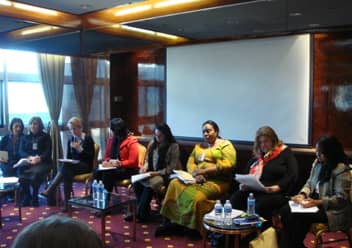
New York, USA
The Permanent Mission of Norway to the United Nations hosted, in collaboration with Parliamentarians for Global Action (PGA), a Side Event on Opportunities and Challenges in Improving Rural Women’s Access to Clean Water and Renewable Energy during the 56th Session of the Commission on the Status of Women.
The purpose of the Side Event was to address challenges women and girls face in developing countries and share concrete initiatives to increase rural women’s access to clean water and renewable energy sources to improve their health and livelihoods. In doing so, women will become agents of change and decision-makers.
Set as an informal conversation among the Norwegian Minister of Children, Equality and Social Inclusion, the Tunisian Minister of Women and Family Affairs, five Members of Parliament from different regions of the world, and a renewable energy entrepreneur, the Side Event covered the following issues:
- Relevant country experiences on the adverse impacts of water scarcity, traditional fuels and climate change on rural women;
- From local to global: concrete initiatives to ensure rural women’s participation in sustainable energy and access to clean water;
- Drafting and implementing legislation on the universal right to clean water and renewable sources of energy through a gender lens;
- The gender dimension of a green economy: why is it important?
Since the main objective was to engage the participants in a lively discussion, the last 30 minutes was reserved for interactive dialogue between the speakers and the audience.

